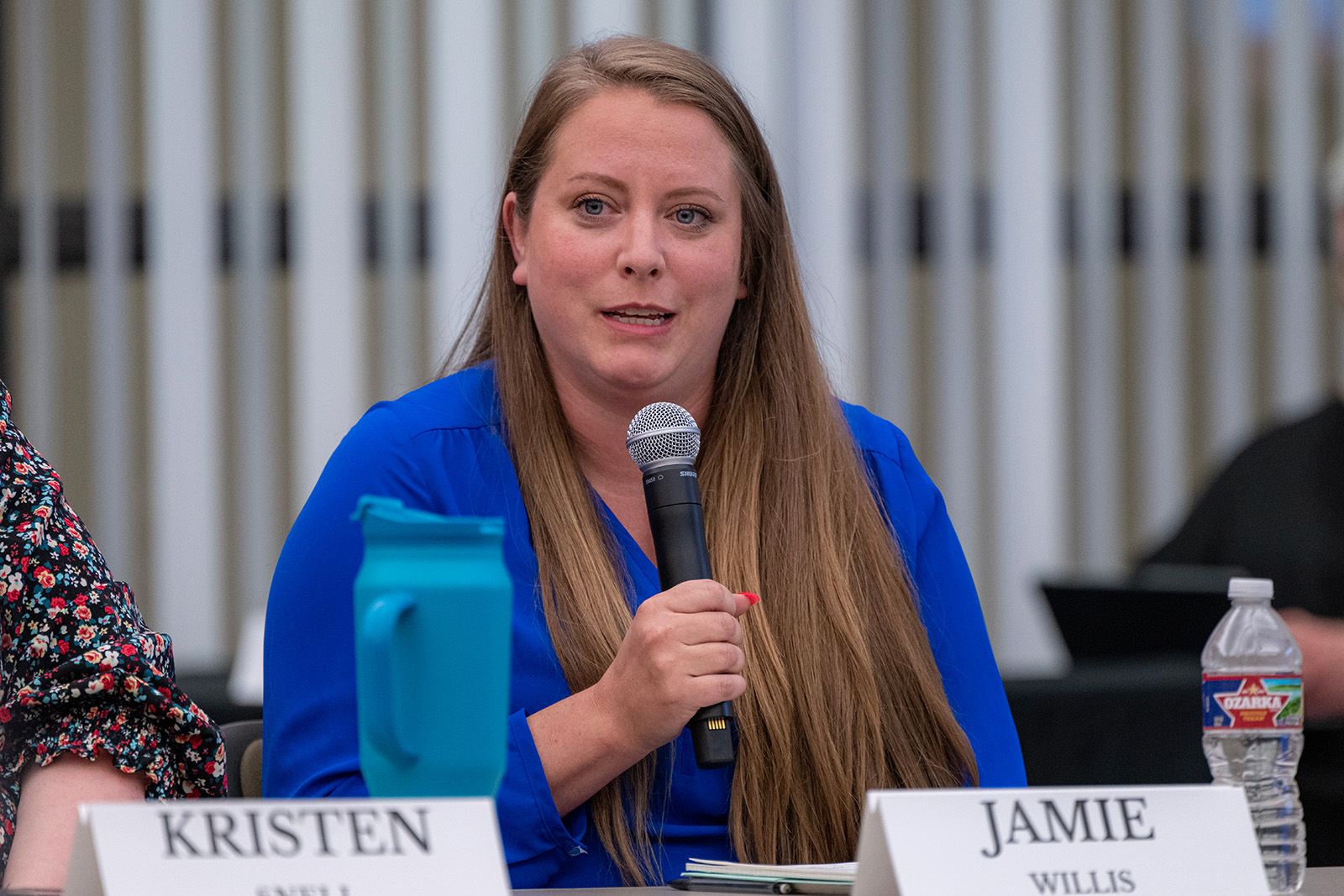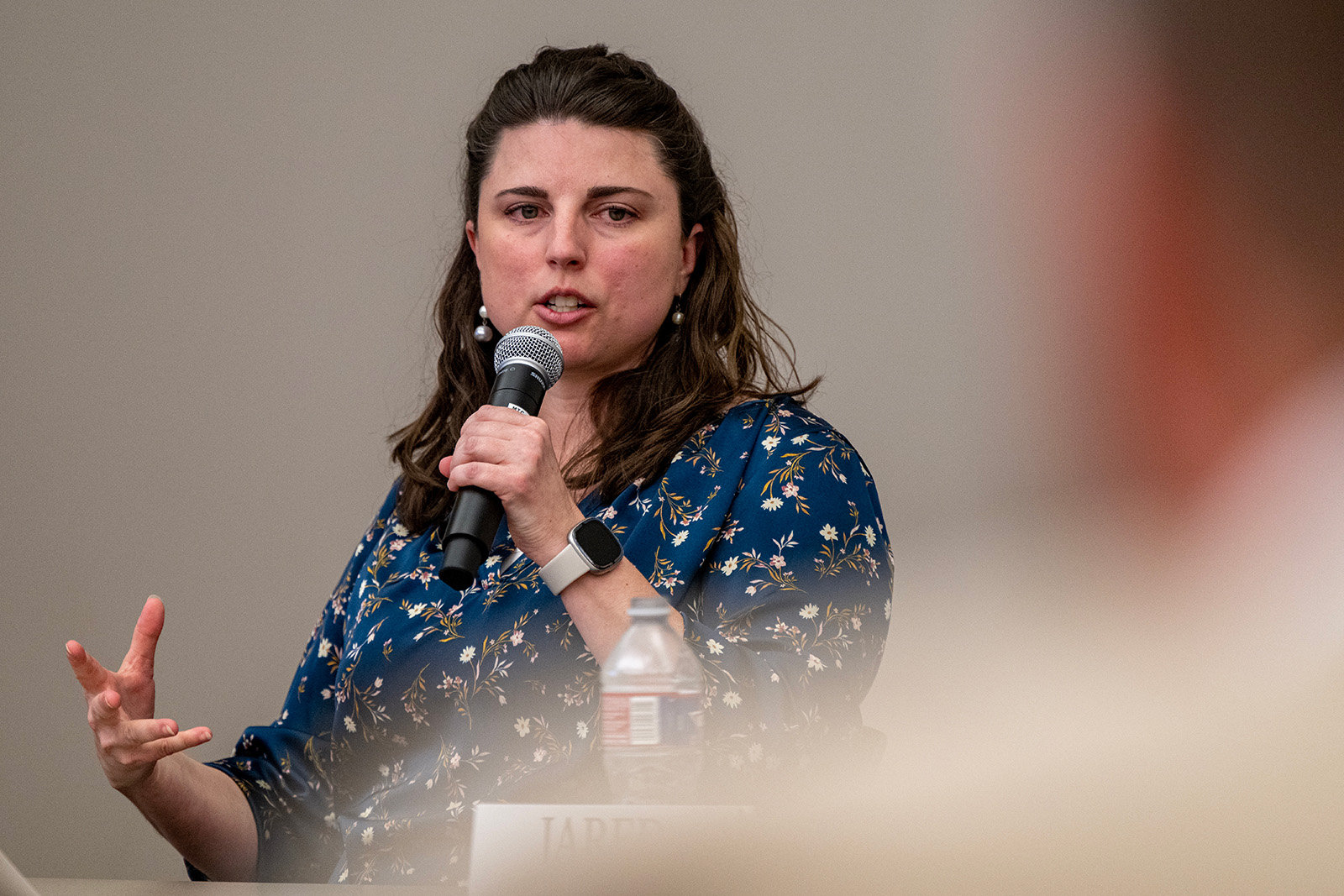Part of a series on domestic violence in Springfield and Greene County.
- Related story: What you can do to help
- Need help? See related story
Many people assume domestic violence is a problem of the poor — most likely because it’s more common to see or hear about law enforcement responding to domestic calls in poorer neighborhoods.
Local experts call that a dangerous stereotype. Domestic violence is about power and control, they say, not socioeconomic status.
“It’s all different types of people,” said Emily Shook, a Greene County assistant prosecutor and head of the domestic violence unit. “I know just statistically there are victims in my private life who have probably never said a word.”
Shook pointed to a few different reasons why domestic violence is underreported among middle class and affluent households.
People who have money tend to live farther away from their neighbors, Shook said.
“A lot of reports that we have are generated because people live in apartment complexes,” she said. “Someone hears screaming. They’re fighting. They hear banging … and they call in a complaint.
“People who have greater economic means may also really prize and value their privacy,” Shook said. “(They) are going to be more likely to go get a five- or 10-acre lot where no one can hear or see the things that are going on in the privacy of their own home.”
People with money have different reasons for not wanting to report domestic violence, she said.
“If you have more, then in some ways you have more to lose,” Shook said. “Let’s say that you are a woman who is married to a very influential person. He’s on a bunch of boards in the community. He has a job where he makes a lot of money.
“People know his name. They recognize (him) when they see him. The judges would recognize him. It might be newsworthy if people knew what was happening within your house,” she continued. “He has money to hire a high-powered attorney to go after you. He maybe had significant financial control where you don’t even know what or where your assets are. You’re not working. You don’t have an education. You’re super financially dependent on that person.
“You realize that if you report and there’s a charge filed, there will be a news story that says, ‘Prominent banker and philanthropist is a batterer.’”

Jamie Willis, director of the Greene County Family Justice Center, said the center serves people across all demographic levels. Willis acknowledged the majority of victims coming to the center don’t have much money, but there’s several reasons for that.
People who have money don’t need to apply for free legal services. They can hire their own attorney, Willis said. Also, upper and middle-class victims are less likely to need emergency shelter or assistance finding a rental. These are all services provided at the center.
“If I was in a domestic violence situation right now, I have family members that I could go live with,” Willis said, “where I would feel relatively safe.
“I have a good job. I know I could call my boss today and say, ‘Well, I didn’t want to tell you this but things are really crazy. I need to take a few days off so I can get my stuff in order.’ And he would be like, ‘Yes, take the time off. When you come back, we are going to make sure someone meets you in the parking lot and walks you inside.’
“I wouldn’t need housing. I wouldn’t need minutes for my cell phone. I wouldn’t need assistance with my utility bill.”
It is also true that domestic violence can lead to poverty, as a victim escapes and leaves behind a more comfortable financial situation, Willis said.
But do those in poverty experience domestic violence at a higher rate than middle and upper class?

Paula Rector, a senior instructor at Missouri State University who developed a domestic violence class, says yes.
“There is no doubt that living in poverty and not being able to access services and not having affordable housing, not having access to health care, not having living wage employment — those things have an impact,” Rector said.
Rector said all of those factors create more stressful conditions, which then contribute to higher rates of child abuse and family violence.
Regardless, she said, poverty is not the cause of domestic violence.
“A lot of service providers, they want to be clear that this can happen in any class because it can,” she said, “because this is about controlling another person. At the end of the day, this is a very decided effort on the part of an abuser to control another person.”
Do drugs and alcohol lead to more domestic violence?
Another common belief is that people who use drugs and/or alcohol are more likely to commit acts of domestic violence.
While alcohol and drugs can make a situation worse, they do not cause domestic violence, Willis said.
“Domestic violence is so much bigger than just having a violent outburst because you’re mad and under the influence,” she said. “It’s much more about that continued pattern of power and control.
“Obviously when alcohol and drugs are at play, it can intensify situations,” she said. “It absolutely can trigger violent events when domestic violence is present.”
Domestic violence often leads to substance abuse as a coping mechanism, Willis added.
“When you’re feeling really hopeless about your life and the situation you’re in, a lot of people will use that to numb what’s going on or to cope with some of their fear and anxiety,” she said.
Some abusers intentionally get their victim addicted as another way to control them, especially when the abuser is also trafficking the victim, Willis said.
“There is an overlap sometimes between domestic violence and trafficking because people that are trafficked are often trafficked by their partner,” she said. “There is definitely the use of drugs and alcohol to get people using, to get victims to agree to things that they wouldn’t typically agree to or to make them look less credible or like less of a good parent.”
When victims seek services at the Greene County Family Justice Center and are struggling with substance use, they will be offered connection to a treatment program.

How often are women the aggressor?
According to the National Coalition Against Domestic Violence, one in four women and one in nine men will experience domestic violence in their lifetime.
In researching domestic violence in Greene County, the Hauxeda reviewed 397 court cases involving domestic violence charges filed in Greene County in 2022.
Of those 397 cases, 56 (14 percent) of the defendants were female.
Only one female defendant was charged with first-degree domestic assault in 2022. That woman’s felony charge was eventually lowered to a fourth-degree misdemeanor domestic assault and she was given probation, which she’s already violated.
She allegedly stabbed a man she knew in the back and apparently bit him. Court documents said the victim was not enthusiastic about cooperating with police.
By the end of May 2023, 35 of the 56 cases filed against women had been resolved in some way, including 19 where charges were dropped.
Victims of domestic assault recant up to 80 percent of the time, which leads to the case being dropped.
Brandi Bartel, executive director of the Victim Center, said men often don’t report domestic violence or cooperate with law enforcement because of shame and embarrassment.
“For men and boys, oftentimes society doesn't see them as a victim because they should be able to protect themselves,” Bartel said. “Or there is just this macho toxic masculinity that can happen in our society in which they don’t feel safe to report the crimes or they worry they won’t be believed or supported.”
Men are less likely to seek services for victims because they believe those organizations are geared to serve only women, Bartel said.
(Harmony House, the Victim Center and the Greene County Family Justice Center serve all people of any gender.)

